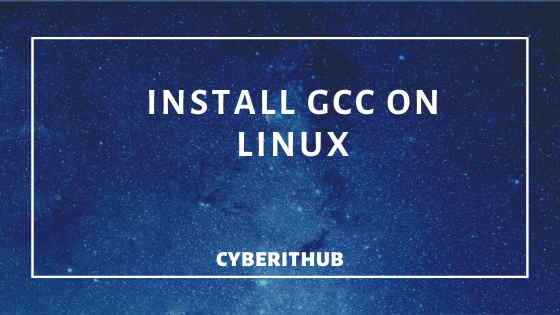Table of Contents
In this article I will take you through the steps to install GCC on CentOS 7. As per GCC Document ,The GNU Compiler Collection includes front ends for C, C++, Objective-C, Fortran, Ada, Go, and D, as well as libraries for these languages (libstdc++,...). GCC was originally written as the compiler for the GNU operating system. The GNU system was developed to be 100% free software, free in the sense that it respects the user's freedom.

Install GCC On CentOS 7
Also Read: How to install PHP on Ubuntu 18.04
Step 1: Prerequisites
a)You need to have a running CentOS 7 System.
b)Also you need to have wget installed in your system with internet connection.
c)Lastly you need to login with root access or user with sudo access to run gcc installation commands. In this tutorial, I am using root access.
Step 2: Update Your System
Firstly you need to update your system using yum update command. This command will update all the currently installed packages in your system to the latest available version.
[root@localhost ~]# yum update
Loaded plugins: fastestmirror
Determining fastest mirrors
* base: mirrors.piconets.webwerks.in
* extras: mirrors.piconets.webwerks.in
* updates: mirrors.piconets.webwerks.in
base | 3.6 kB 00:00:00
extras | 2.9 kB 00:00:00
....................................
Step 3: Download and Install GCC from Repository
Download from Repository and install gcc tool using yum install gcc command.
[root@localhost ~]# yum install gcc Loaded plugins: fastestmirror Loading mirror speeds from cached hostfile * base: mirrors.piconets.webwerks.in * extras: mirrors.piconets.webwerks.in * updates: mirrors.piconets.webwerks.in Resolving Dependencies --> Running transaction check ---> Package gcc.x86_64 0:4.8.5-39.el7 will be installed --> Processing Dependency: cpp = 4.8.5-39.el7 for package: gcc-4.8.5-39.el7.x86_64 .........................................
Step 4: Install from Source Code.
There is another method that you can use to install gcc tool in your system, that is through source code which is also the recommended way to install.
Download Source Code
Download GCC Source File from GNU FTP Site using wget. It will download gcc package in local directory.
[root@localhost ~]# wget https://ftp.gnu.org/gnu/gcc/gcc-9.2.0/gcc-9.2.0.tar.gz --2019-12-31 04:47:37-- https://ftp.gnu.org/gnu/gcc/gcc-9.2.0/gcc-9.2.0.tar.gz Resolving ftp.gnu.org (ftp.gnu.org)... 209.51.188.20, 2001:470:142:3::b Connecting to ftp.gnu.org (ftp.gnu.org)|209.51.188.20|:443... connected. HTTP request sent, awaiting response... 200 OK Length: 124304709 (119M) [application/x-gzip] Saving to: ‘gcc-9.2.0.tar.gz’ 100%[==============================================================================================================================>] 124,304,709 2.83MB/s in 49s 2019-12-31 04:48:27 (2.43 MB/s) - ‘gcc-9.2.0.tar.gz’ saved [124304709/124304709]
Extract the Files
Once downloaded, you need to extract the gcc package by using tar -xvf gcc-9.2.0.tar.gz command.
[root@localhost ~]# tar -xvf gcc-9.2.0.tar.gz
Build the Configuration
Once extracted go to gcc-9.2.0 directory by doing cd gcc-9.2.0 and run ./configure.
[root@localhost ~]#cd gcc-9.2.0 [root@localhost ~]#./configure
Compile the Source Code
Once configuration completed successfully, now it is time to compile the source code by running make command.
[root@localhost ~]#make
Install GCC Using make
Once all the source code are compiled, it is now time to install them using make install command.
[root@localhost ~]#make install
NOTE:
Step 5: Check GCC Version
Once GCC is installed in your system, you can check the gcc version by using gcc --version command.
[root@localhost ~]# gcc --version
gcc (GCC) 4.8.5 20150623 (Red Hat 4.8.5-39)
Copyright (C) 2015 Free Software Foundation, Inc.
This is free software; see the source for copying conditions. There is NO
warranty; not even for MERCHANTABILITY or FITNESS FOR A PARTICULAR PURPOSE
Step 6: Write Your first C Program
Since that we have installed GCC Compiler now, let's write our First "Hello World" C Program.
[root@localhost ~]# cat hello.c #include <stdio.h> void main() { printf("Hello World\n"); }
Let's Compile this Program.
[root@localhost ~]# gcc -o hello hello.c
Check the Output. It shows Hello World in the output.
[root@localhost ~]# ./hello
Hello World
Also Read: How to create a Filesystem on Linux Partition
Popular Searches
- centos install gcc
- gcc linux
- what is gcc
- gcc download
- gcc latest version
